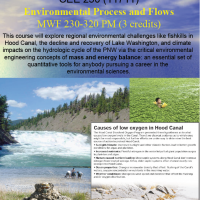This course can fulfill the ‘human and social dimensions’ requirement of either the Environmental Studies major or minor
The Human Animal: German 298, Clit 298, Envir 495, and English 365.
Professor Richard Block (blockr@uw.edu).
MWF: 11:30-12:30, Condon Hall 139.
VLPA (can perhaps be taken for “W” credit with approval of instructor)
Modernity’s unprecedented assertion of human rights has been an equally unprecedented disaster for our fellow creatures. Never before have humans so systematically slaughtered and tortured the other animals on the planet in service of their own needs. To boot, human-caused global warming threatens the survival of as much as 65 percent of the known species on the planet. How is it that we have come to be at war with our animal nature? Has it always been that way or is it something about how humans have come to view themselves in the wake of the Enlightenment and its civilizing processes that now threatens the very survival of our fellow creatures. These are the questions that will frame discussions in this course. We will pursue a loose historical trajectory, beginning with antiquity, to consider how previous ages have understood their relations with the animal kingdom. We will be also interested in how privileging the human has led to the dehumanization and slaughter of so-called lesser humans. Finally, we will consider the role of the human, if any, at the end of days when, according. to the Book of Isiah, the wolf shall dwell with the lamb, and the leopard shall lie down with the young goat.
Course format: Lecture and discussion
Course requrements: Two short essays and a final longer essay (It may be possible to take the course for “W”credit.).
Readings include: Ovid, The Metamorphosis (excerpts); Aristotle (excerpts various works); essays from Montaigne and Descartes; H.G. Wells, The Island of Dr. Moreau; Herman Melville, “The Whiteness of the Whale” from Moby Dick; Virginia Woolf, Flush; Edward Albee, The Goat; and Grant Morrison, Frank Quitely, We Three (a graphic novel); King Kong (the movie). On occasion we will also consider selected chapters from The Old Testament.
What You Can Expect to Learn in This Class:
How the current environmental crisis can be traced to our changed relations with the animal kingdom;
How to historicize texts and refuse naturalizing the present;
How to read closely and compose a coherent and cogent essay based on those readings.




